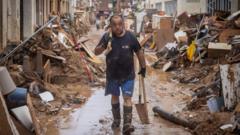The aftermath of the devastating floods in eastern Spain has unleashed a wave of political blame, swiftly replacing the initial unity among leaders. The disaster, having caused the death of at least 218 people, has led to heated disputes over responsibility for the inadequate response.
Regional leader Carlos Mazón, representing the conservative People's Party (PP) in Valencia, initially offered gratitude to Socialist Prime Minister Pedro Sánchez for government support. This cooperative moment was stark against the backdrop of Spain’s traditionally polarized political scene. However, criticism soon arose surrounding Mazón’s delayed reaction to a red weather warning from Aemet, the national meteorological agency, which was issued hours before the deluge wreaked havoc.
Alberto Núñez Feijóo, the national PP leader, has since criticized the information disseminated by Aemet, implying that the central government had failed to properly coordinate with the regional authorities. In the days following the disaster, Mazón has faced pressure to resign, particularly for disbanding the Valencia Emergency Unit (UVE) shortly after taking office last year.
As tensions escalated, Mazón defended himself by shifting blame to the CHJ hydrographic agency, also controlled by the Madrid government, alleging that they improperly managed alerts. The CHJ clarified its role, stating that it provides rainfall data but does not issue direct alerts.
The ongoing crisis has seen an influx of military and police personnel into the Valencia region, aiming to manage the recovery. Despite Mazón asserting that the armed forces were responsible for mobilizing resources, the head of the military emergency unit insisted that it was the regional government's responsibility to request such support, a claim that sparked anger among government officials.
Compounding the situation, calls from Feijóo for a national state of emergency have emerged, which would centralize crisis management in Madrid and potentially undermine Valencia’s regional authority. The far-right Vox party leader, Santiago Abascal, endorsed this approach, while the current government has rejected it, upholding that Sánchez is accountable for failing to deploy adequate state resources during the disaster.
Public anger has manifested dramatically; during a recent visit to the hardest-hit town of Paiporta, leaders, including the king, faced backlash from residents expressing their frustration over the slow response. This uproar questioned the effectiveness of the leaders’ pledges to assist in recovery efforts.
In response to the devastation, Mazón has proposed a significant €31.4 billion reconstruction plan, while Sánchez has announced an initial aid package of €10.6 billion. As tensions rise, Sánchez emphasized the need for a united front: "What Spaniards want is to see their institutions, not fighting with each other, but working shoulder to shoulder."
















